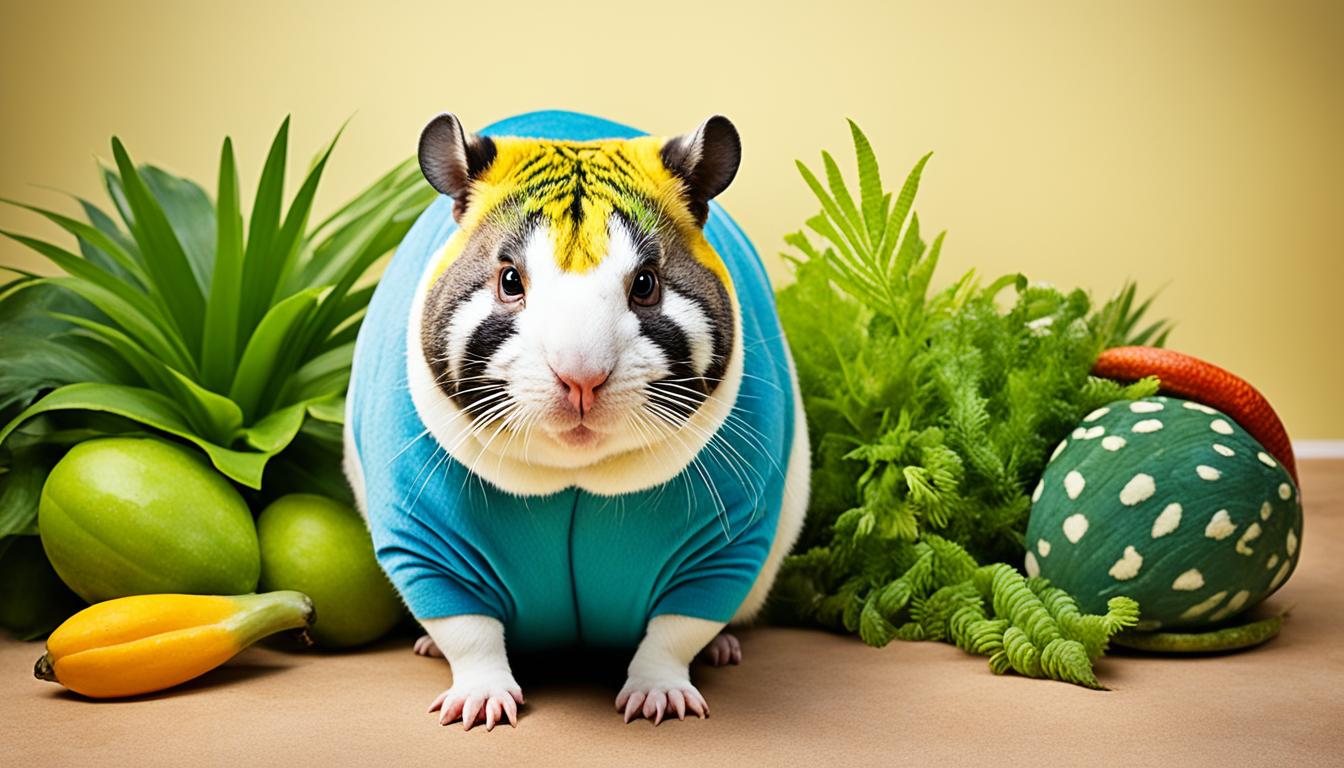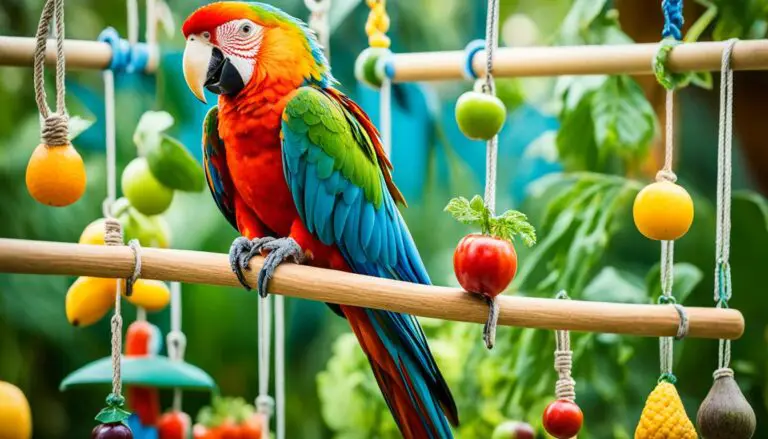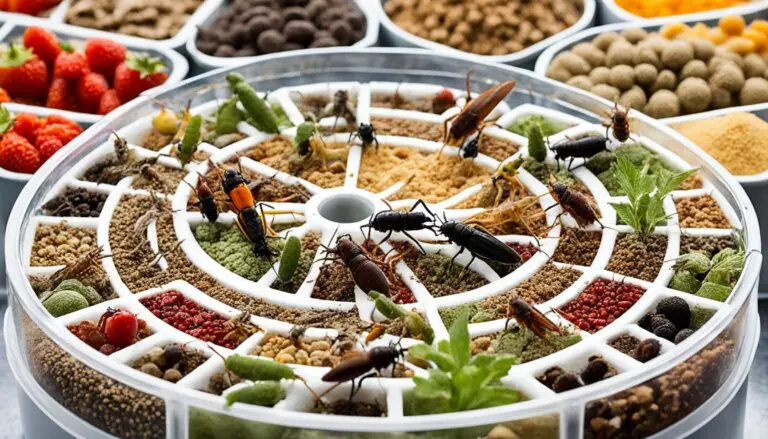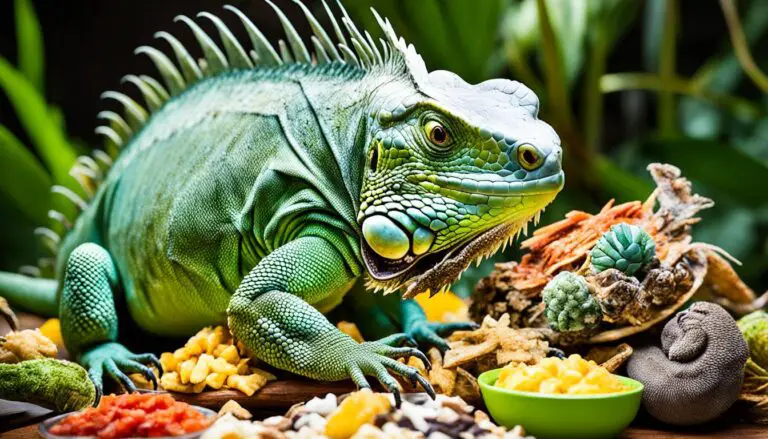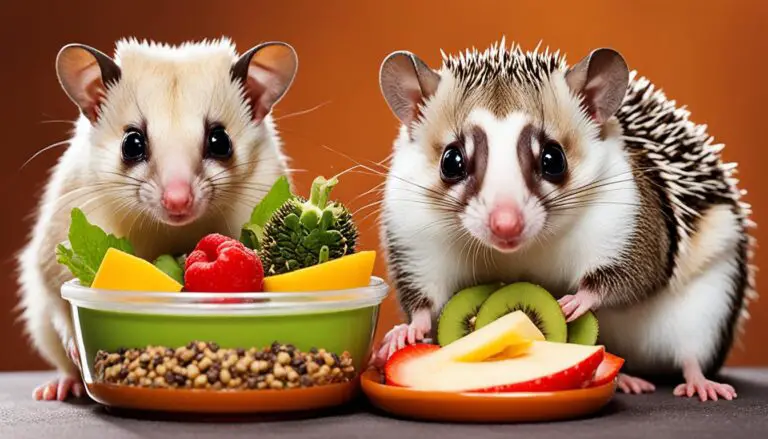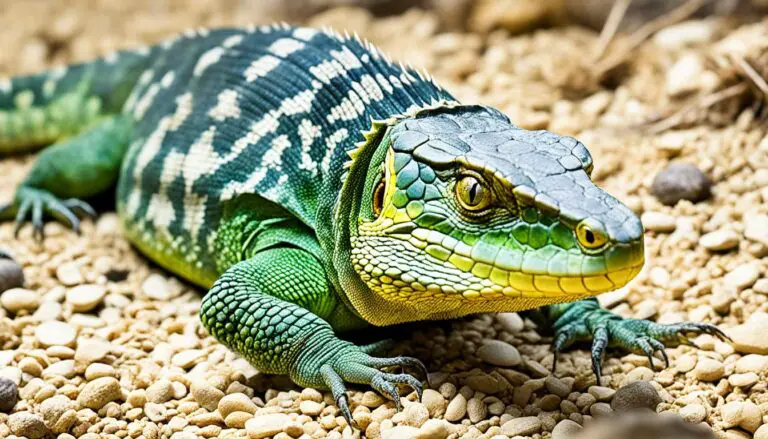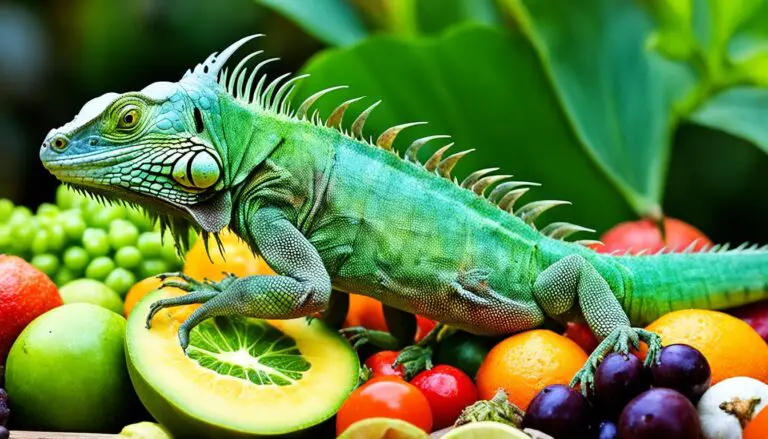Exotic Pet Obesity Management Guide
Did you know that many exotic pets are obese? Just like cats and dogs, these unique animals might gain too much weight. This can hurt their health and happiness. If you have an exotic pet, it’s important to prevent obesity. We’ll show you how in this guide, so your pet can be healthy and happy.
Key Takeaways:
- Obesity is prevalent in exotic pets and can have negative health consequences.
- Understanding the causes and incidence of obesity in exotic pets is vital for prevention.
- Proper nutrition and portion control are essential for managing weight in exotic pets.
- Regular exercise plays a crucial role in maintaining a healthy weight and overall well-being.
- Consulting with a veterinarian is necessary for a comprehensive weight management plan.
The Causes and Incidence of Obesity in Exotic Pets
Obesity in exotic pets is a big problem that harms their health. It’s key to know why and how often this happens. This helps keep these pets from getting too heavy and stay healthy.
Many things can make exotic pets overweight. Some of these are:
- Overfeeding: Giving too much food can make exotic pets gain weight.
- Lack of exercise: Not moving enough means they burn fewer calories, leading to weight gain.
- Poor diet choices: Eating the wrong or low-quality food hurts the health and weight of these pets.
- Certain medical conditions: Some health issues or medicines might make it easier for exotic pets to become obese.
To avoid obesity in exotic pets, owners must understand these causes. They should act to keep their pets at a normal weight. Here are things pet owners can do:
- Find the right diet for your pet: Talk to a vet or an animal food expert. They will help pick the best diet for your exotic pet.
- Control how much food they get: Don’t give too much food. Measure the food based on your pet’s diet needs. Remember, each pet species is different.
- Get them moving: Have your pet do activities that fit its species. This could be playing, hunting for food, or changing its living space.
- Check their body and weight often: Make sure your pet’s weight stays normal. If it changes, see a vet right away for advice.
“Keeping exotic pets at a healthy weight needs the right food, limited portions, exercise, and watching how they change.”
Stopping obesity in exotic pets is crucial for their long and happy life. Good weight management by owners is key. They should get advice from a vet or an expert in caring for exotic animals.
Nutritional Requirements for Exotic Pets
Good nutrition is key for the health of exotic pets. These unique animals need the right diet to stay fit. To make this diet, it’s smart to talk with a vet or an expert in animal nutrition.
Feeding exotic pets well is not like feeding regular pets. Their needs are different because of their special bodies. We must give them food that’s full of the nutrients they need to be healthy.
Keeping exotic pets at a healthy weight needs careful food amounts. We should follow guidelines for what and how much to feed. Vets can help us know the right amounts based on our pets’ size, age, and how active they are.
Here are some tips for feeding exotic pets right:
- Make sure the food you give is balanced. This means the food has everything your pet needs – like protein, carbs, fats, and vitamins. Mix fresh fruits, veggies, and the right kinds of food that are made or chosen carefully. This keeps your pet’s diet well-rounded.
- Each type of exotic pet has its own food needs. For instance, animals that eat plants need fiber. Those that eat meat need lots of protein. Talk to a vet to find out what’s best for your pet’s kind.
- Always have clean water ready for your pet. Some pets might need more water from time to time, like by being misted with water. This depends on the kind of pet you have.
- Don’t give too many treats, and choose them wisely. Only let treats make up a small part of what your pet eats. Stick to treats that are good for your pet and keep away from human food that could be bad for them.
Keeping your exotic pet at a good weight is crucial for their health. Using the right food and getting help from a vet makes sure they get what they need. This helps them stay healthy and live a long, happy life.

The Benefits of a Balanced Diet for Exotic Pets
A good diet is vital for the health of exotic pets. The right nutrients keep their bodies working well. It also boosts their immune system, helping them stay healthy and fight off sickness.
| Benefits of a Balanced Diet for Exotic Pets |
|---|
| 1. Healthy weight maintenance: A balanced diet prevents obesity and helps maintain a healthy body weight, reducing the risk of weight-related health issues. |
| 2. Improved digestion: Proper nutrition ensures optimal digestion and nutrient absorption, reducing the risk of gastrointestinal problems. |
| 3. Enhanced immune system: A well-rounded diet supports a strong immune system, helping exotic pets fight off infections and diseases more effectively. |
| 4. Healthy coat and skin: Adequate intake of essential nutrients promotes a shiny coat and healthy skin in exotic pets. |
| 5. Improved dental health: Chewing on appropriate, nutritious foods helps maintain proper dental health and prevents dental issues in exotic pets. |
| 6. Optimal organ function: Providing the necessary nutrients ensures that exotic pets’ organs function properly, promoting overall health. |
Body Condition Scoring and Assessment
It’s very important to keep an eye on your exotic pet’s body condition. This helps control their weight and stop them from becoming obese. Body condition scoring (BCS) is a good way for pet owners to check the weight and body condition of their exotic pets. It lets them see if there are any changes and then do things to keep the pet’s weight healthy.
What is Body Condition Scoring?
Body condition scoring is a way to check how much body fat and muscle animals have. It looks at areas like the ribs and waist to give an idea of the pet’s overall condition. This method helps say if the pet is too thin, too heavy, or just right.
How to Perform Body Condition Scoring:
To check your exotic pet’s body condition, do this:
- Look at the pet’s shape and build.
- Feel its ribs to see if they are easy to feel.
- Check the waist behind the ribs.
- Look for any belly bulges or drooping.
- Notice the muscle in the legs and all over the body.
By noting these things, you can give your pet a condition score from 1 to 5. One means very thin, five means too fat, and three is what most exotic pets should aim for.
Benefits of Body Condition Scoring:
Checking your pet’s body condition helps you know its weight and health. It lets pet owners:
- Spot weight changes early
- Do the right things to manage weight problems
- See if their weight plans are working
Weight Management Strategies:
After checking your pet’s body condition, work to keep their weight healthy. This might mean changing their diet, getting them more exercise, or controlling how much they eat.
“Keeping a record of your pet’s body condition scores over time can help you track their progress and ensure they stay within a healthy weight range.”
Get advice from a vet or an animal nutritionist about how to manage your pet’s weight. They can help with what kind of food to choose, when and how much to feed, and the best ways to exercise them.
Table: Body Condition Score Scale
| Score | Body Condition |
|---|---|
| 1 | Emaciated |
| 2 | Underweight |
| 3 | Ideal weight |
| 4 | Overweight |
| 5 | Obese |
By keeping a close eye on your pet’s body condition and managing their weight, you can avoid problems caused by obesity. This is essential for your pet’s health and happiness.
Co-morbidities Associated with Obesity
Obesity hurts the health of exotic pets. It can cause several health problems. Knowing this, pet owners must prevent obesity.
The Health Risks of Obesity in Exotic Pets
Extra weight can harm pets like snakes and birds. It can cause diabetes, arthritis, heart disease, and breathing problems.
- Diabetes: Obesity can lead to diabetes, causing serious health issues.
- Arthritis: It may lead to joint problems making them in pain and less mobile.
- Heart Disease: Obese pets face high risks that could be life-threatening.
- Respiratory Problems: It can be harder for them to breathe with too much weight.
- Increased Surgical Risks: Being overweight makes surgeries more dangerous for them.

“Addressing obesity in non-traditional pets is vital. With a vet’s help, owners can manage their pet’s weight. This plan can lower the risk of many health problems.”
Developing a Comprehensive Weight Management Plan
To tackle obesity, working with a vet is key. They can help make a plan for your pet. This could involve a special diet and fun exercise routines.
- A customized diet meets your pet’s nutritional needs and helps them lose weight.
- Exercises should be fun and safe for your pet’s species. They can improve mobility.
- Keeping an eye on weight and body condition is important. It helps adjust the plan as needed.
- It’s also crucial to treat any health problems that might be causing the weight gain.
| Co-morbidity | Risk Factors | Preventive Measures |
|---|---|---|
| Diabetes | Poor diet, lack of exercise | Controlled diet, regular exercise, monitoring blood glucose levels |
| Arthritis | Excess weight, lack of exercise | Weight management, physical therapy, joint supplements |
| Heart Disease | Obesity, sedentary lifestyle | Weight management, regular exercise, cardiac monitoring |
| Respiratory Problems | Excess weight, reduced lung capacity | Weight loss, improved fitness, respiratory therapy if necessary |
| Increased Surgical Risks | Obesity-related complications | Weight loss before surgery, careful anesthesia management |
Fighting obesity in pets prevents serious diseases. This helps exotic pets enjoy a long, healthy life.
Feeding Options and Species-Specific Guidance
Dealing with obesity in non-traditional pets like exotics needs the right feeding choices. It’s crucial to pick the right feed and follow specific advice for each species. This includes using diets made for specific pets, making food at home, and advice that’s just for non-typical pets.
Owners should talk to a vet or a pet nutritionist for the best diet advice. They’ll help figure out the perfect food for their unusual pet, based on its needs. They’ll help pets reach a healthy weight too, which is key.
Commercial Diets:
There are diets made just for exotic pets that are easy for owners. These foods meet pets’ needs and keep them at a good weight. They have all the right nutrients and the right amount to eat, which is great for fighting obesity.
Homemade Diets:
Making food at home might be what some pet parents choose for their unusual pets. It gives them control over what their pet eats. But, getting advice from a vet or a pet nutrition expert is a must. They can make sure the homemade diet is just right for the pet’s health and weight goals.
Species-Specific Guidance:
Every exotic pet has different food needs, and knowing these is important. You need to think about what they would eat in the wild. For example, pet reptiles that eat insects might need extra calcium. Herbivore mammals thrive on a diet high in fiber. Consulting with a pet expert helps make sure your pet is eating right to manage its weight.
| Feeding Options | Benefits |
|---|---|
| Commercial Diets | – Formulated for specific exotic pet species – Convenient and portion-controlled – Ensure balanced nutrition |
| Homemade Diets | – Gives pet owners more control – Can be tailored to specific preferences – Consultation with professional is crucial |
| Species-Specific Guidance | – Takes into account unique nutritional needs – Considers natural dietary habits – Optimizes weight management goals |
Getting expert help and considering what each species needs lets owners choose the best food for their exotic pets. This is crucial for handling obesity and keeping pets healthy and happy. They live longer and better when they’re at a good weight.
Consultation with a Veterinarian
It’s important to visit a vet regularly with your pet. Vets help keep overweight pets healthy and prevent obesity. They also offer advice on diet, exercise, and managing weight for each specific pet.
At the visit, the vet checks your pet’s weight and health. If there are any changes or worries, they talk about it with you. They suggest specific steps to prevent your pet from becoming overweight.
“A veterinarian plays a crucial role in recognizing the early signs of weight gain and obesity in non-traditional pets. They have the knowledge and expertise to develop a comprehensive weight management plan, promoting the overall well-being of the pet.”
The vet and you will work together on a plan to manage your pet’s weight. This includes what your pet eats, how much it exercises, and how to keep an eye on its progress.
Vets keep up with the latest info on what exotic pets should eat. They give advice on the best food and how much to give based on research. This ensures your pet gets a diet perfect for staying healthy.
Benefits of Consulting with a Veterinarian
Seeing a vet about your pet’s weight has a lot of pluses:
- Expertise: Vets know a lot about exotic pet health. They give advice on how to prevent obesity and manage weight based on science.
- Individualized Approach: Each exotic pet gets a plan that fits its unique needs. Vets tailor strategies to the pet’s lifestyle.
- Monitoring Progress: Vet visits help check your pet’s health and weight. The plan gets updated as needed to keep your pet on track.
- Early Detection of Health Issues: Vets can spot and take action against health problems related to obesity early. This can help prevent more serious issues.
Working with a vet is key to helping your pet avoid obesity. Vets help keep your pet healthy and full of life.
| Veterinary Consultation Benefits | Explanation |
|---|---|
| Expertise | Vets know a lot about taking care of exotic pets. They offer great advice on how to keep pets from getting too heavy. |
| Individualized Approach | Vets make plans that are just right for each different pet. This makes sure your pet’s weight is carefully taken care of. |
| Monitoring Progress | By seeing your pet regularly, vets keep track of its weight and health. They make changes to the plan as it’s needed. |
| Early Detection of Health Issues | Vets can find and deal with health problems from obesity early. This stops more problems from happening later. |
Regular vet check-ups help you keep your non-traditional pet’s weight in check. This promotes your pet’s well-being and stops obesity health issues before they start.
Balanced Diet and Portion Control
Keeping a balanced diet is key for your exotic pets. This includes birds, reptiles, and small mammals. It’s vital for their health. Your vet’s advice on what and how much to feed is crucial.
Don’t give too many treats or human food. Extra treats can make your pet too heavy. This leads to health problems. Give them the right diet instead.
Measuring food is important to keep your pet at a good weight. If you measure their food, they won’t eat too much and get fat.
Don’t let your pet eat whenever they want. It messes with how they should eat naturally. Set regular times for them to eat. This helps you know how much they’re eating.
Each exotic pet needs a diet that fits them. For some pets, this might be insects or special plants. Talk to your vet or a nutritionist to get the best advice for your pet.
Benefits of a Balanced Diet and Portion Control
A good diet and eating the right amount have many good outcomes. They keep your pet at a healthy weight and prevent illness. Also, a great diet gives them all the nutrients they need for a good life.
Monitoring Your Exotic Pet’s Body Condition
It’s very important to check your pet’s weight regularly. Look at them and feel for any changes. If you see they’ve gained or lost a lot of weight, see your vet. This could mean there’s a problem.
Keeping your pet at the right weight takes effort. Smart feeding and check-ups are part of this. With the right diet and care, your pet will be healthier and happier for a long time.
Common Exotic Pet Portion Sizes and Feeding Recommendations
| Exotic Pet | Portion Size | Feeding Recommendations |
|---|---|---|
| Parrot | 1-2 tablespoons of pellets or formulated diet | Offer fresh fruits, vegetables, and occasional treats |
| Reptile | Approximately the size of their head | Provide a variety of appropriately sized prey items or commercial diets |
| Rabbit | 1/4 to 1/2 cup of fresh greens per 2 pounds of body weight | Limit high-starch foods and treats; hay should be available at all times |
| Gerbil | 1-2 tablespoons of commercial gerbil food | Offer small portions of fruits, vegetables, and occasional treats |
Regular Exercise
Exotic animals need exercise to not get overweight. Just like with common pets, moving around a lot keeps them healthy. Owners can do activities like walks or playing with their pets every day.
Non-traditional pets like birds, reptiles, or small mammals need special kinds of activity. Research and talk to a vet to find out the best exercises for your specific pet.
Moving around helps exotic pets lose weight and is good for their heart and muscles. It also keeps their minds active.
Exercise Ideas for Exotic Pets:
- Set up a fun place with toys and things to climb on for your pet to explore.
- Make games or puzzles that make your pet think and move to get their food.
- Use toys that make your pet work for their treats, like they would in the wild.
- Take your pet outside safely so they can enjoy nature and the sun.
- Find others online who have exotic pets to share tips and ideas for fun activities.
Watch your exotic pet closely when they are active to make sure they’re not getting too tired. If they seem too tired or don’t feel well, talk to a vet.
For weird pets, exercise is key to keeping them fit. It helps them stay at a good weight and be lively and happy.

| Benefits of Regular Exercise for Exotic Pets | Exercise Guidelines |
|---|---|
| Improves cardiovascular health | Research species-specific exercise guidelines |
| Strengthens muscles and promotes flexibility | Consult a veterinarian for expert advice on suitable activities |
| Provides mental stimulation and reduces stress | Create an enriching environment with suitable toys and structures |
| Prevents boredom and destructive behaviors | Supervise outdoor sessions for secure pets |
Mindful Treats and Monitoring
Choosing treats carefully can help control your exotic pet’s weight. It’s smart to pick healthy, low-calorie snacks for them. This way, your pet can stay fit and happy.
It’s important to keep an eye on your exotic pet’s weight and health. Make sure to check their body shape regularly. Look for any big changes and act quickly if you notice something off.
Watch out for signs that your pet might be getting too much food. Signs like getting very fat, being tired all the time, or having a hard time breathing. Talk to a vet if you see any of these signs. They can help you get your pet back to a healthy weight.
Proper Feeding Practices for Exotic Pets
Feeding your exotic pet right is key to keeping them healthy. Always make sure they get the right food in the right amounts. Let’s look at important ways to do this:
Avoid Cafeteria-Style Feeding
Don’t let your pets eat all day. It can make their diet unhealthy. Set a feeding plan and give them the correct amount of food for their needs.
Opt for Nutritionally Complete Products
Choose food that’s made for your pet’s specific needs. Make sure it has everything they need, like nutrients and vitamins, for a healthy diet. This prevents health problems and helps them grow well.
Pelleted Diets for Certain Exotic Pets
Some pets do great on pelleted foods, like reptiles and birds. These foods are complete and stops them from picking bad foods. Always ask a vet if this is good for your pet.
Supplement with Fresh Foods
Adding fresh foods is also important. Treat them with fruits, veggies, and some lean meats. But, remember, some foods are bad for them, like chocolate. Always check with your vet before adding new foods.
Monitor Weight and Adjust Portions
Keeping an eye on your pet’s weight is crucial. Change their food amount if they gain or lose weight. This keeps them from getting too fat, leading to a healthier life.
“Proper feeding keeps exotic pets healthy. Using careful feeding methods ensures they get what they need without extra weight. “

| Feeding Practices | Benefits |
|---|---|
| Avoid Cafeteria-Style Feeding | Prevents overeating and imbalanced diets |
| Opt for Nutritionally Complete Products | Provides essential nutrients for a balanced diet |
| Pelleted Diets for Certain Exotic Pets | Reduces the risk of nutrient deficiencies |
| Supplement with Fresh Foods | Provides variety and additional nutrients |
| Monitor Weight and Adjust Portions | Maintains a healthy weight and prevents obesity |
Conclusion
Handling obesity in exotic pets needs a full plan. It includes proper diet, controlling how much they eat, fitting workouts, and help from the vet on weight loss strategies for exotic pets. By using these methods, owners can get their pets back to a healthy weight. This brings joy and better health to the pets.
Remember that taking care of exotic pets is a team effort. Owners and vets work together. Regular visits to the vet ensure the pet’s weight and health are checked well. This also gets owners personalized advice for their pet’s needs.
Choosing the right food, controlling portions, exercising often, and vet check-ups matter a lot. This helps pets stay fit and happy. With proper care and a full plan, exotic pets can enjoy a good life. They can stay healthy and full of life.
FAQ
What are the common causes of obesity in exotic pets?
How can I prevent obesity in my exotic pet?
How can I determine if my exotic pet is overweight?
What health risks are associated with obesity in exotic pets?
What should I feed my exotic pet to help them maintain a healthy weight?
How often should I take my exotic pet to the veterinarian for weight management?
Can treats contribute to weight gain in exotic pets?
What feeding practices should I follow for my exotic pet?
How important is exercise for managing weight in my exotic pet?
How can I monitor my exotic pet’s weight and overall condition?
What is the comprehensive approach to managing obesity in exotic pets?
Source Links
- https://invma.org/combating-pet-obesity-for-a-healthier-fur-family/
- https://vetbooks.ir/the-management-of-pet-obesity/
- https://www.merckvetmanual.com/management-and-nutrition/nutrition-exotic-and-zoo-animals/nutrition-exotic-and-zoo-animals
Peter Stones is the founder of Exotic Pets Place, the leading online resource for exotic pet care information.
With over 10 years of hands-on exotic pet ownership experience, he is deeply passionate about sharing his expertise to help others properly care for their unusual pets.
When he's not writing extensively researched articles or connecting with fellow exotic pet enthusiasts worldwide, you can find Peter at home tending to his own beloved menagerie of exotic animals.

